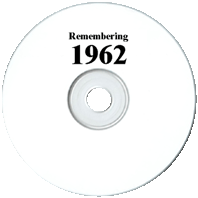

John Glenn became the first American astronaut to orbit the earth, the world on the brink of a nuclear war with the Cuban Missile Crisis, and CBS broadcast the final episodes of Suspense and Yours Truly Johnny Dollar on September 30.

19 old time radio show recordings
(total playtime 8 hours, 12 min)
available in the following formats:
1 MP3 CD
or
8 Audio CDs
Text on OTRCAT.com ©2001-2025 OTRCAT INC All Rights Reserved. Reproduction is prohibited.


 A sign that 1962 would be a time of significant change may have come from the heavens with a "Grand Conjunction" on February 4-5. The Earth, the Sun and the new moon all aligned to form a solar eclipse, along with an alignment of the "naked eye" visible planets which were all within a sixteen-degree span of the ecliptic plane. Another reason to gaze skyward came with further successes of NASA's Project Mercury, highlighted by John Glenn becoming the first American astronaut to orbit the earth in Friendship 7 on February 20. Astronaut Deke Slayton had been scheduled to make the next flight but was diagnosed with a cardiac arrhythmia. Slayton's place would be taken by Scott Carpenter in Aurora 7 on May 24. America finally began to "catch up with" the Soviet's in the "Space Race" when Wally Schirra made the longest American space flight to date, six orbits in just over nine hours.
A sign that 1962 would be a time of significant change may have come from the heavens with a "Grand Conjunction" on February 4-5. The Earth, the Sun and the new moon all aligned to form a solar eclipse, along with an alignment of the "naked eye" visible planets which were all within a sixteen-degree span of the ecliptic plane. Another reason to gaze skyward came with further successes of NASA's Project Mercury, highlighted by John Glenn becoming the first American astronaut to orbit the earth in Friendship 7 on February 20. Astronaut Deke Slayton had been scheduled to make the next flight but was diagnosed with a cardiac arrhythmia. Slayton's place would be taken by Scott Carpenter in Aurora 7 on May 24. America finally began to "catch up with" the Soviet's in the "Space Race" when Wally Schirra made the longest American space flight to date, six orbits in just over nine hours.

The National Basketball Association, which was struggling to build a fan-base, got a major shot-in-the-arm when Wilt Chamberlain, then in his third professional season, scored 100 points in a 169-147 victory for the Philadelphia Warriors over the New York Knicks on March 2. The game was played in Hershey, Pennsylvania, in an attempt to gain fans, no members of the New York press were in attendance, and no known video of the game exists. In a happy accident which would warm the hearts of OTR fans, a Warrior fan attending the University of Massachusetts at Amherst, Jim Trelease, wired the radio in his dorm room to the radiator as an antenna and used a reel-to-reel tape deck borrowed from his girlfriend to tape the game's fourth quarter to listen to later.

The future and bringing the benefits of the Space Race to Earth were on the minds of everyone attending the Century 21 Exposition which opened in Seattle, Washington, on April 21. The Seattle World's Fair would be one of the few during the period to turn a profit. The Soviet Union had been invited to participate in the Fair when fair organizers made a visit to Moscow in 1960, but politely declined. The fairgrounds were dominated by the Space Needle, at the time the tallest structure West of the Mississippi and 605 feet. Built in less than a year, the roof of the Needle's revolving restaurant was painted Galaxy Gold, the saucer Re-Entry Red, the legs were Astronaut White and the body of the structure Orbital Olive. President Kennedy had been expected to speak at the Exposition's closing on October 21, but was forced to bow out due to what was reported at the time as a "heavy cold".


Khrushchev claimed that US "piracy" would lead to open war, and historians agree that the episode was the point when the Cold War came closest to heating up into a full nuclear conflict. On October 24-25, vessels were allowed through the blockade after it was determined that they carried no offensive material, and secret negotiations began. Khrushchev agreed to dismantle the missiles in Cuba if the US would agree to remove its nearly obsolete Jupiter missiles from Turkey. Kennedy embraced the offer but kept the quarantine in effect until there was evidence that the missiles in Cuba were being dismantled. On November 2, the President announced that the missiles were, in fact, being removed, and the blockade ended on November 20.
On Christmas Eve, Cuba released the last 1,113 prisoners captured during the Bay of Pigs in exchange for $53 million worth of food.
Text on OTRCAT.com ©2001-2025 OTRCAT INC All Rights Reserved. Reproduction is prohibited.
You have reached the maximum number of votes for a unregistered user.
Please login or create a new account to continue...
You have reached the maximum number to down votes in this page.



1962 Disc A001
|
Add Audio CD to Cart - $5.00 |
1962 Disc A002
|
Add Audio CD to Cart - $5.00 |
1962 Disc A003
|
Add Audio CD to Cart - $5.00 |
1962 Disc A004
|
Add Audio CD to Cart - $5.00 |
1962 Disc A005
|
Add Audio CD to Cart - $5.00 |
1962 Disc A006
|
Add Audio CD to Cart - $5.00 |
1962 Disc A007
|
Add Audio CD to Cart - $5.00 |
1962 Disc A008
|
Add Audio CD to Cart - $5.00 |
Please wait...
COMMENTS
Tom Verified Purchase
Leave a comment